|
 Secure Site
Secure Site
|
 |
Archive for the 'Progressive Awakening' Category
 Koi Pond Ukiyo-e print Now & Zen introduced its original Zen Alarm Clock in 1996, but according to company founder and president, Steve McIntosh, the new bamboo Zen Alarm Clocks are the most beautiful of all their designs. “I’m really proud of the form, function, and sustainability profile of our new bamboo Zen Alarm Clock, it’s our greenest product yet,” said McIntosh.
The bamboo Zen Clock is available in four different dial face choices, with each dial silkscreened directly on bamboo veneer for an integrated, natural look. The new bamboo dial faces include one with contemporary numbers, one with simple modern lines, one with the Japanese character for “dream,” and a “bamboo leaf and stalk motif” inspired by Chinese ink painting.
The wood used in all Now & Zen products is sustainably grown on tree farms, and the company operates according to a strict policy of environmental sustainability for all its operations. However, the introduction of the company’s bamboo line sets a new standard for sustainability. Bamboo, which is a species of grass, is a very “green” material for making clock bodies. Compared to a hardwood forest the same size, bamboo produces 30% more oxygen and 20 times the biomass yield. Bamboo can be harvested annually after the first 5 to 7 years without replanting, compared to 25 to 50 years for trees, which then need to be replanted in bare soil. Moreover, Bamboo is the fastest growing woody plant on the planet, and it’s qualities of oxygen production, carbon sequestering, and water and soil retention make it one of the world’s most sustainable commodities as well.
 Bamboo canes growing in the wild
Now & Zen’s Bamboo Clock Store
1638 Pearl Street
Boulder, CO 80302
(800) 779-6383
 Bamboo Zen Clocks
Posted in Chime Alarm Clocks, Japanese Inspired Zen Clocks, Natural Awakening, Progressive Awakening
 wake up naturally I recently taught my students about chronobiology—the study of cycles in organisms. We talked about the importance of a good night’s sleep, which is greatly aided by allowing sunlight and moonlight to synchronize our internal cycles. This means gradually awakening to morning sunlight and allowing our bodies to relax before bedtime by avoiding bright light.
Taylor had been troubled by insomnia. After this class, she was ready for a change. A few hours before bedtime, she turned off bright lights around the house and wrapped up her computer use for the day (the light from a monitor can throw off your biological clock). An hour before bedtime, she lit candles and turned off all electric lights. By candlelight, she bathed, got into her night clothes and meditated before falling into a deep, peaceful sleep. In the morning, she was awakened by the gradually increasing sunlight and her chime alarm clock with progressively increasing natural acoustic sound by Now & Zen. She came to class glowing with refreshment and a new sense of empowerment. Now Taylor understands that her body needs a relationship with natural cycles of light and dark. “I’m not nearly as groggy as I used to be,” she says. “Light really is stimulating!”
adapted from Natural Home Magazine, September/October 2009 by Carol Venolia
If you don’t have the luxury to gently wake up to by light — try the next best alternative…waking gently to soothing chimes. Out Soothing Digital Chime Clock’s long-resonating Tibetan bell-like chime makes waking up a beautiful experience – its progressive chimes begin your day with grace.
Carol Venolia is an eco-architect and co-author of Natural Remodeling for the Not-So-Green House (Lark Books, 2006). She teaches in the Sustainable Communities program at Dominican University of California.
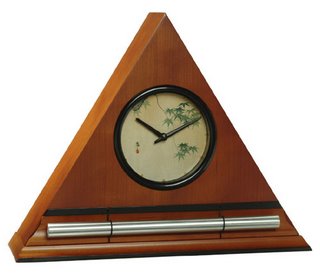 Gentle Chime Clock to help you Naturally Wake-Up Now & Zen’s Natural Chime Alarm Clock Store
1638 Pearl Street
Boulder, CO 80302
(800) 779-6383
Posted in Chime Alarm Clocks, Natural Awakening, nature, Progressive Awakening, sleep, Sleep Habits, wake up alarm clock, Well-being
 Sanmonji, sleeping cat Perfect alarm clock gift makes waking up a calming and relaxing experience
Replace Your Loved Ones Alarm Clock, so that you don’t have to be awakened by their Frightening, Beeping Alarm Clock…
Are you tired of your husbands alarm clock?
What makes this gentle awakening experience so exquisite is the sound of the natural acoustic chime, which has been tuned to produce the same tones as the tuning forks used by musical therapists. According to the product’s inventor, Steve McIntosh, “once you experience this way of being gradually awakened with beautiful acoustic tones, no other alarm clock will ever do.”
Boulder, Colorado—an innovative company has taken one of life’s most unpleasant experiences (being startled awake by your alarm clock early Monday morning), and transformed it into something to actually look forward to. “The Zen Alarm Clock,” uses soothing acoustic chimes that awaken users gently and gradually, making waking up a real pleasure. Rather than an artificial recorded sound played through a speaker, the Zen Clock features an alloy chime bar similar to a wind chime. When the clock’s alarm is triggered, its chime produces a long-resonating, beautiful acoustic tone reminiscent of a temple gong. Then, as the ring tone gradually fades away, the clock remains silent until it automatically strikes again three minutes later. The frequency of the chime strikes gradually increase over ten-minutes, eventually striking every five seconds, so they are guaranteed to wake up even the heaviest sleeper. This gentle, ten-minute “progressive awakening” leaves users feeling less groggy, and even helps with dream recall.
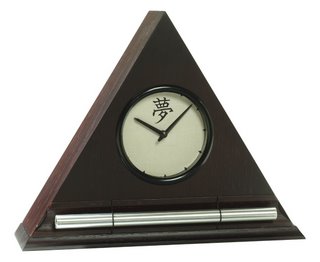 zen alarm clocks for a peaceful awakening Now & Zen’s Clock Store
1638 Pearl Street
Boulder, CO 80302
(800) 779-6383
Posted in Bamboo Chime Clocks, Now & Zen Alarm Clocks, Progressive Awakening, sleep, Sleep Habits, Well-being
 sleeping problems How to Fight Too Much Sleep
Not getting enough sleep can sometimes be a bad thing. But did you know that getting too much sleep is just as bad?
Set an alarm . It doesn’t have to be too early, just enough to get anywhere from 7-9 hours of sleep. Do this for at least a month and your body will get used to waking up at this time so you won’t have to use the alarm. Try not to hit to snooze button, however, it trains your body to stay tired in morning. If you have a coffee machine that will start at certain time automatically, set it so you can wake up to the scent of fresh brewed coffee.
Or just use an alarm clock that is not disruptive!
Fortunately, for those who want to wake up right, without being startled awake by an annoying alarm or some radio DJ, there is The Zen Alarm Clock. This clock was designed to make waking up a kind of spiritual practice. The Zen Clock wakes users with a built-in 10 minute gradual progression of acoustic chimes. And this gradual form of “progressive awakening” has been thoughtfully designed to include esoteric features that are fitting for a form of spiritual practice. For example, not only is the hardwood Zen Alarm Clock beautiful to see and hear, the clock’s chime is tuned to produce the same frequencies as the tuning forks used by musical therapists in their healing work. Moreover, the Zen Clock’s pre-programmed 10 minute chime progression sequence advances according to the “golden ratio,” which reflects both the natural proportions of our own bodies and the patterns of growth used in the overall evolution of the universe.
adapted from Wikihow.com
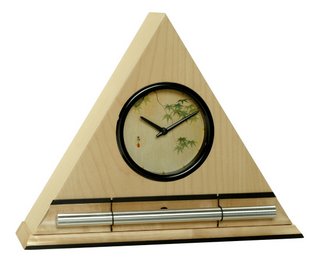 Chime Alarm Clock for a Gradual Awakening Now & Zen’s Chime Alarm Clock Store
1638 Pearl Street
Boulder, CO 80302
(800) 779-6383
Posted in Bamboo Chime Clocks, Natural Awakening, Now & Zen Alarm Clocks, Progressive Awakening, sleep, Sleep Habits
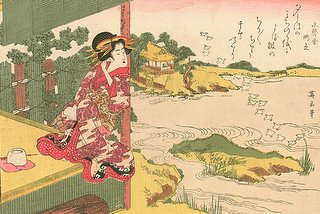 sleeping outside, a perfect place for dream time... There’s something irresistibly romantic about sleeping outside. Long a part of cowboy and camping traditions, it achieved architectural expression in the late 19th and early 20th centuries with the rise of the sleeping porch. The idea continues to evolve. Whether used for a daytime catnap or a full night’s rest, open-air sleeping platforms can give you a chance to enjoy summer weather to the fullest.
Garden sanctuary
As a child, Marni Leis wanted a backyard playhouse. She realized her dream as an adult by building what she calls her “teahouse.” The 6- by 13-foot screened pavilion occupies a wooden platform near a small pond. Gauzy curtains frame the entrance and provide privacy and bug protection when needed. A shallow gabled roof covered with translucent fiberglass shelters the area from rain and drizzle without blocking the light. A portable Digital Zen Alarm Clock sits on a basket table by the futon bed on the platform bed.
She furnished the space with comfortable, stylish pieces, including a chair found at a flea market, an old coffee table, and an antique bookcase. “I used fabrics I could wash easily, because they are exposed to the elements,” she says. “I also used pieces that meant something to me. These give the place an air of nostalgia. When you’re there, you feel like you could be in another time or place. It’s great to get outside away from the noise and be alone with nature.”
Boulder, Colorado—an innovative company has taken one of life’s most unpleasant experiences (being startled awake by your alarm clock early Monday morning), and transformed it into something to actually look forward to. “The Zen Alarm Clock,” uses soothing acoustic chimes that awaken users gently and gradually, making waking up a real pleasure. Rather than an artificial recorded sound played through a speaker, the Zen Clock features an alloy chime bar similar to a wind chime. When the clock’s alarm is triggered, its chime produces a long-resonating, beautiful acoustic tone reminiscent of a temple gong. Then, as the ring tone gradually fades away, the clock remains silent until it automatically strikes again three minutes later. The frequency of the chime strikes gradually increase over ten-minutes, eventually striking every five seconds, so they are guaranteed to wake up even the heaviest sleeper. This gentle, ten-minute “progressive awakening” leaves users feeling less groggy, and even helps with dream recall.
adapted from Sunset Magazine by Mary Jo Bowling
 Digital Zen Alarm Clocks, for a calm awakening Now & Zen’s Gentle Chime Alarm Clock Store
1638 Pearl Street
Boulder, CO 80302
Posted in Bamboo Chime Clocks, Chime Alarm Clocks, Japanese Inspired Zen Clocks, Natural Awakening, Now & Zen Alarm Clocks, Progressive Awakening, Sleep Habits
 Butterflies Plate #21, Natural History of Britain on the patio
the afternoon drifts along
with the butterfly.
– Patricia J. Machmiller
 Maple Dream Kanji Zen Alarm Clock, progressive chime alarm clock
Now & Zen – The Zen Alarm Clock Store
1638 Pearl Street
Boulder, CO 80302
Posted in Beauty, Japanese Inspired Zen Clocks, Japanese Poetry, Meditation Timers, Meditation Tools, mindfulness practice, Now & Zen Alarm Clocks, Progressive Awakening
 set your alarm so you can enjoy a nap Author Cathleen Schine pays tribute to the many pleasures of daytime sleeping. Read her testimonial, then go catch 40 winks yourself.
by Cathleen Schine
Scientific research has finally caught up with the lifework of my family. For three generations, we have been exploring, questioning, experimenting, passing along our findings from parent to child. We are not neuroscientists or psychologists, like those who have come after us. We are simply…nappers. A nap, where I come from, is sacred.
Sometimes, after large and indulgent family meals, we nap communally, sharing sofas head to foot, curled in chairs and sprawled, beside the dog and one another, on the floor. We firmly believe that no gathering can be deemed a success unless it culminates in every single person falling asleep in the living room.
Mostly, however, we understand the nap to be an endeavor embarked on alone, though often recounted later in every detail, like a Homeric epic tale, to eager listeners. My mother calls to tell me how pretty the light looked through the curtains when she came home from work. Of course, she had to sink into the couch and take a nap. My brother describes a snooze in his red chair with a book and Chester the cat. In the way that some people never suffer from a cold but always have a “terrible” cold, in the way that rain in California is never rain but “torrential” rain, naps for my family are never naps but “delicious” naps.
Oddly, the new scientific nap studies do not mention “delicious” naps. Their focus is on the practical use of these short bouts of sleep and the benefits they bestow on us, as if they were fiber-rich food. Scientists have found that naps make us more alert and more creative, improve our mood, and increase our productivity. Matthew Walker, an assistant professor of psychology at the University of California at Berkeley, was quoted by theNew York Times as saying, “You need to sleep before learning, to prepare your brain, like a dry sponge, to absorb new information.”
Although my brain often feels like a dry sponge, the one you find under the kitchen sink, way back next to the jar of desiccated silver polish, I cannot endorse this utilitarian interpretation of the nap.
I am gratified to know that a Harvard Medical School study showed that a 45-minute nap improves learning and memory, and I am relieved to discover that a 26-minute nap in flight enhanced a pilot’s performance by 34 percent and overall alertness by 54 percent (his copilots manned the controls, so don’t worry). The biphasic sleep schedule (which involves taking a nap in addition to sleeping at night) may help us move information from the hippocampus to the prefrontal cortex, where it becomes part of our long-term memory.
This is all to the credit of the nap, which I am prepared to celebrate in every way possible. But where, in these studies, is the joy? The romance? The cool, smooth surface of the white pillowcase? The light seeping gently through the white curtains? The slow inhalation of that clean, laundered scent? Where, indeed, in these studies, is the light itself?
A nap is not a nap without light. This is what distinguishes it from a good night’s sleep. A nap is a stolen moment, not the natural culmination of the day. A nap is secret, illicit. It is sleeping during the day, and the day must be present and visible. There must be light—ideally dappled in a garden or slanted through a window: soft and filtered and gentle. An afternoon sleep in a darkened room is not a nap, in my opinion. It is a migraine.
In fact, the best night’s sleep I ever had was on a trip to Norway, just near the Arctic Circle, in the summer. The sun never set, and I was able to “nap” all night.
 Enjoy a good nap Researchers suggest that naps are exceedingly effective in clearing our minds so we can fill them up again, and though I object to evaluating a nap solely in terms of its “effectiveness,” I would say that afternoons have the best napping light—when the sun seems to settle into a soft, deep repose. I don’t think a nice midmorning snooze should be devalued, however.
After a night of insomnia, after watching the milky pale light of dawn appear around the edges of the window shades, after hearing the chatter of sparrows, to get out of bed at last and have a cup of coffee and read the paper and feel blissfully alone, and then, like a punch to the head, be overcome with fatigue and stumble back to bed, where the sheets and the pillowcase have become especially cool and inviting—this is, without a doubt, one of life’s unforgettable pleasures.
Which brings me to another distinction researchers have not yet made: the city nap versus the country/suburban nap. When I’m in my apartment in New York City and about to take an afternoon nap, I usually turn on the air conditioner. This muffles the world outside in a way that, as far as I’m concerned, is not necessary in a morning nap that follows a sleepless night but is extremely pleasant in the afternoon. The young men generously sharing their booming music through open car windows, the gym class bouncing basketballs on their way to the park—all of this is part of the city I love, but not part of a nap.
Outside the city, however, the window stays open. The sound of a distant dog barking, of a crow calling harshly from a high branch or a finch singing from a telephone pole, the wind rustling the leaves—this is the stuff of naps.
When my eldest son was very small, he had trouble falling asleep at night. It turned out he was worried that he might not wake up. He has always been a thoughtful person, and in this association of sleep and death, he had joined a long tradition: the Bible, Shakespeare, the Romantic poets. There is something about the oblivion of sleep that reminds us of death—or at least what we think (or worry or, at times, even hope) death might be like. Naps are different: They are not weighted with the profound. Naps float, weightless and temporal, nature’s whims.
I was thrilled to read about the importance of naps in the formation of memory, and I’m grateful for the scientific work being done in this area. But thinking of that little boy pondering the inevitable and the unknowable, I was even more grateful for a family legacy that taught me, and allowed me to teach him, that not everything has to be useful, not everything has to lead to something more—that sometimes, for no reason and with no purpose, you can just curl up on the couch, feel the soft breeze, and drift into a soft, delicious sleep that leads to nowhere in particular, and back again. Remember to set you gentle chime alarm so that you nap can end calmly.
 soothing chime alarms, a great tool for napping About the Author
Cathleen Schine is the author of eight novels, including The New Yorkers, The Love Letter, Rameau’s Niece, and, most recently, The Three Weissmanns of Westport. She lives in New York City and Venice, California.
 chime alarm clock store, Boulder, Colorado Now & Zen Chime Alarm Headquarter Store
1638 Pearl Street
Boulder, CO 80302
(800) 779-6383
Posted in Bamboo Chime Clocks, Now & Zen Alarm Clocks, Progressive Awakening, sleep, Sleep Habits
 Dream Recall
The Digital Zen Alarm Clock can help you remember and use your dreams in two basic ways: First, by not abruptly interrupting your dreams and allowing your dreaming mind to “finish the dream;” and secondly, by giving you the time between chimes to lie in bed undisturbed when you are first awakened, so you can recall your dreams. Depending on how deeply you are sleeping when the clock’s alarm is triggered, it may take several chimes of the Digital Zen Alarm Clock to arouse you from a dreaming state, or you may be awakened by the first chime. But even if the first chime does wake you, it is possible to resume or re-enter a dream from which you are marginally awakened if you are allowed to return to the dream without further disturbance. The interval between the first and second chimes can provide a period of time for you to reach a cathartic conclusion to your dream. Preventing the abrupt interruption of your dreams acts to preserve your dream experiences, and maximizes the psychic benefits to be derived from improved memory of your dreams.
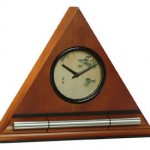 Zen Clocks by Now & Zen There is general agreement among dream researchers that “natural” awakening (as opposed to using a clock radio or buzzer alarm) aids in dream retention and understanding. The Digital Zen Alarm Clock comes closer to providing a natural awakening than practically any other wake-up aid. For best results, as you are falling asleep at night, resolve that your first thought upon waking will be the recollection of your dream. Whether or not you are in the middle of a dream when the chime wakes you, your best dream memories will be available in your first moments of waking consciousness.
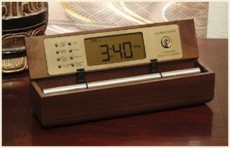 Digital Zen Alarm Clock
Before opening your eyes or moving, lie quietly and try to remember your dream. Recall the sequence of events and the most vivid images. When you have a conscious memory of your dream, you are ready to open your eyes and get up. Keeping a notebook by your bed to write down your dream memories can also be helpful. Discovering the value of your dream life can be richly rewarding.
Posted in Natural Awakening, Now & Zen Alarm Clocks, Progressive Awakening, Zen Clocks and Dream Recall
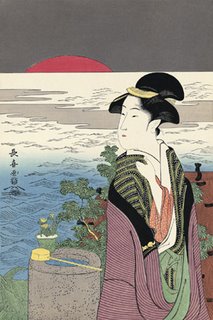 Choki Eishosai, Sunrise at New Year It turns out that toddlers are not the only ones who do better after an afternoon nap. New research has found that young adults who slept for 90 minutes after lunch raised their overall learning power, their memory apparently primed to absorb new facts.
Other studies have indicated that sleep helps consolidate memories after cramming, but the new study suggests that sleep can actually restore the ability to learn.
The findings, which have not yet been published, were presented Sunday at the annual meeting of the American Association for the Advancement of Science in San Diego.
“You need to sleep before learning, to prepare your brain, like a dry sponge, to absorb new information,” said the lead investigator, Matthew P. Walker, an assistant professor of psychology and neuroscience at the University of California, Berkeley.
The study recruited 39 healthy young adults and divided them into two groups. All 39 were asked to learn 100 names and faces at noon, and then to learn a different set of names and faces at 6 p.m. But 20 of the volunteers who slept for 90 minutes between the two overall learning sessions improved their scores by 10 percent on average after sleeping; the scores of those who didn’t nap actually dropped by 10 percent.
Set your Zen Alarm Clock in your office and take a little snooze so that you can prime your brain for the best overall learning experience.
adapted from The New York Times, February 2010 by Roni Caryn Rabin
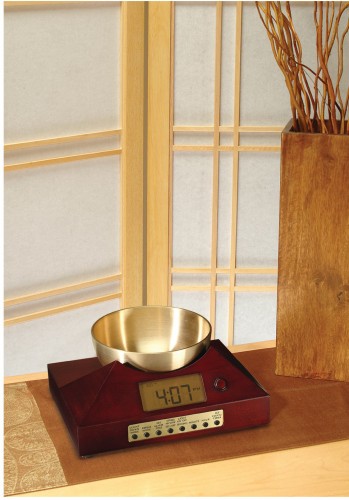 Zen Timepiece, an alarm clock to wake one from napping with Tibetan bowl/gong Now & Zen
1638 Pearl Street
Boulder, CO 80302
Posted in Bamboo Chime Clocks, Chime Alarm Clocks, Japanese Inspired Zen Clocks, Natural Awakening, Now & Zen Alarm Clocks, Progressive Awakening, Sleep Habits, Well-being
 snooze news from Now & Zen, Inc. New research shows that getting a good night’s rest can do more than help you feel your best the next day—it can also reduce your risk of developing diabetes. Scientists at the University at Buffalo found that people who sleep fewer than six hours a night during the work week are 4.5 times more likely to have elevated levels of blood sugar than those who snooze six to eight hours.
Why? “Inadequate sleep activates the sympathetic nervous system, which can lead to insulin resistance and glucose intolerance,” says Lisa Rafalson, research assistant professor at the University at Buffalo and author of the study. “Lack of sleep may also cause us to eat more, and being overweight is a strong risk factor for diabetes.”
adapted from Natural Solutions, August 2009
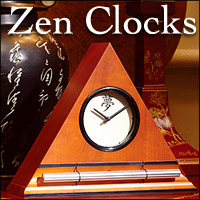 Chime Clocks for a Natural Awakening
Now & Zen’s
Clock Store
1638 Pearl Street
Boulder, CO 80302
Posted in Chime Alarm Clocks, Japanese Inspired Zen Clocks, Natural Awakening, Now & Zen Alarm Clocks, Progressive Awakening, Well-being
« Previous Page — « Previous Entries
Next Entries » — Next Page »
|
|
|
|